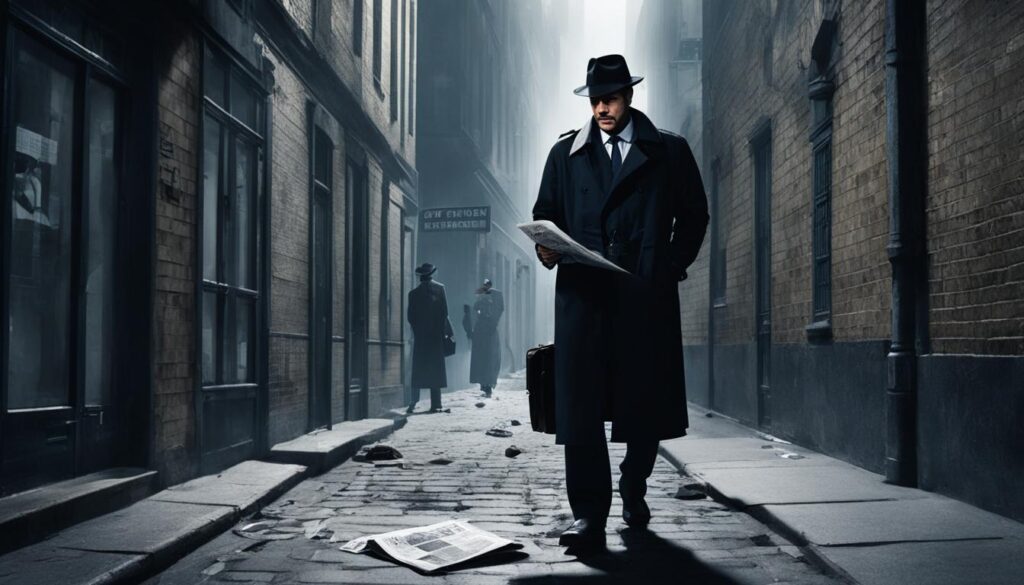Welcome to our riveting audiobook review of “The Foreign Correspondent” by renowned author Alan Furst. Set against a backdrop of espionage during wartime, this thrilling novel has garnered critical acclaim and captured the imaginations of readers worldwide. In this section, we’ll delve into the details of this captivating audiobook, exploring its characters, plot, setting, writing style, and narration. Join us as we uncover the espionage and suspense that await in “The Foreign Correspondent”.
About the Author
Alan Furst, born in New York City in 1941, is an American author of historical spy novels. He attended Oberlin College and later studied at the Institut d’Études Politiques de Paris. His passion for European history is evident in his writing, as he often sets his novels in Europe during the interwar period and World War II.
Furst is the author of several critically acclaimed novels, including The Polish Officer, The Spies of Warsaw, and The Foreign Correspondent. His work has been translated into many languages and has earned him numerous awards, including the Grand Prix de Littérature Policière and the Edgar Award.
Furst’s background and experience living in Europe have had a significant influence on his writing. He has stated that he is drawn to the world of espionage and espionage fiction because it allows him to explore the complex history of Europe in the 20th century. His writing style is known for its attention to historical accuracy and detail, vividly depicting the sights, sounds, and emotions of the time period in which his stories are set.
Plot Summary
“The Foreign Correspondent” is a thrilling novel filled with espionage and danger set in Europe during the turbulent years leading up to World War II. The story follows the adventures of Carlo Weisz, a correspondent for an underground newspaper. Carlo is an Italian who works for a newspaper agency in Paris, France. Carlo is in a relationship with a fellow journalist, Christa von Schirren, who has fled Nazi Germany.
The storyline is packed with action and drama as Carlo becomes embroiled in the resistance efforts against the Nazis. Carlo’s newspaper is dedicated to exposing the truth about the fascist movement and the atrocities committed by the Nazis. His efforts put him in danger as he must navigate through various threats and obstacles to deliver the truth to the world.
As the Nazis’ grip tightens on Europe, Carlo must flee Paris and go into hiding. The twists and turns of the story see Carlo travel to Italy and eventually Switzerland, where he continues his dangerous work as a foreign correspondent. Along the way, he meets a cast of characters, including a beautiful woman and Swiss banker, Gabrielle, who helps him in his efforts to expose the truth.
In summary, “The Foreign Correspondent” is a captivating tale full of espionage, danger, and intrigue. The book’s rich storyline, full of twists and turns, keeps readers on the edge of their seats until the very end.
Characters
“The Foreign Correspondent” introduces a cast of intriguing characters, each with their own unique roles, personalities, and motivations within the story. At the forefront is protagonist Carlo Weisz, a journalist and anti-fascist who becomes embroiled in the dangerous world of espionage. Weisz is joined by a host of other memorable characters, including:
| Character | Description |
|---|---|
| Christa von Schirren | A photographer who becomes Weisz’s love interest and partner in his mission to document the growing threat of fascism |
| Von Haefen | A Nazi official who poses a threat to Weisz and his anti-fascist allies |
| Luca Tessitore | A Fascist police officer who forms an unlikely alliance with Weisz |
| Max de Lyon | A French operative who works behind the scenes to support Weisz’s anti-fascist efforts |
These characters – and many more – contribute to the complex web of relationships and conflicts woven throughout the narrative, adding depth and richness to the storyline. Fictional or real, each component of the story is developed with the utmost detail, providing wholly believable, human depictions of both the villains and heroes that live and breathe in Furst’s universe.
Setting
“The Foreign Correspondent” takes place in Europe during the late 1930s, amidst the rising tensions and political turmoil that preceded the outbreak of World War II. The story is set primarily in Italy, with rich descriptions of its bustling cities and scenic countryside. The historical backdrop of this time period lends an added layer of authenticity and depth to the narrative, exposing readers to the complex geopolitical landscape of pre-war Europe.
One of the standout features of the novel’s setting is the vivid imagery used to convey the atmosphere and mood of the various locales. From the dimly-lit cafes of Milan to the sprawling estates of Italian nobility, every setting is meticulously detailed and brimming with authentic period-specific detail. Whether describing a bustling city street or a quiet mountain village, Alan Furst’s writing transports readers to a bygone era where the world was on the cusp of historic change.
Writing Style
In “The Foreign Correspondent,” Alan Furst exhibits a masterful writing style that immerses the reader in the world of espionage and international intrigue. Furst’s prose is elegant and descriptive, setting the stage for the complex events that unfold throughout the novel. His use of descriptive language paints vivid pictures of the characters, settings, and actions in the story, creating a fully-realized atmosphere that captivates the reader.
One of Furst’s greatest strengths is his ability to balance descriptive passages with action and plot development. His descriptive language never feels excessive or indulgent, but rather serves to enhance the tension and suspense of the story. Readers are treated to an elegant and evocative prose that truly brings the story to life.
Additionally, Furst employs a non-linear narrative approach that adds to the intrigue of the novel. The story unfolds gradually, with pivotal events and revelations unfolding slowly over time. This approach builds tension and suspense, giving the reader a sense of the high stakes and complex nature of the international conflict at the center of the story.
The combination of Furst’s elegant prose, descriptive language, and non-linear narrative makes “The Foreign Correspondent” an atmospheric and gripping espionage thriller that is not to be missed.
Themes

Alan Furst’s “The Foreign Correspondent” delves into several central themes that explore the complexities of espionage and wartime conflict. Set against the backdrop of 1930s Europe, the novel provides a glimpse into the dangerous world of international relations, where political motivations and power struggles can have significant consequences.
One of the key themes is espionage, as the characters navigate a world of secrets and deception to uncover vital information that can determine the outcome of the war. The novel also explores the theme of wartime conflict, highlighting the challenges and sacrifices made by both soldiers and civilians during this tumultuous time.
Throughout the novel, Furst weaves a complex web of relationships and alliances, demonstrating the intricacies of international relations and the impact of these dynamics on individuals and societies. The characters must navigate these complexities, balancing their own agendas with the greater good, leading to both moral and personal dilemmas.
Overall, “The Foreign Correspondent” provides a thought-provoking exploration of espionage, wartime, and the complexities of international relations, reminding readers of the high stakes involved in political conflict and the sacrifices made by individuals caught in the midst of it.
Audiobook Narration
One of the greatest strengths of “The Foreign Correspondent” audiobook is the captivating and skillful narration by George Guidall. Guidall’s performance stands out for its clear and engaging delivery, as he deftly captures the voice and tone of each character in the novel. His pacing is excellent, with a nuanced approach that mirrors the tension and suspense of the plot.
Guidall’s portrayal of the main protagonist, Carlo Weisz, is particularly noteworthy. He captures the complex emotions and motivations of the character, bringing him to life with a nuanced and empathetic performance. Additionally, Guidall’s performance of the other characters in “The Foreign Correspondent” is equally impressive, with each one given a unique and distinctive voice that adds depth and authenticity to the story.
The tone of Guidall’s narration throughout “The Foreign Correspondent” is spot on, capturing the tension and intrigue of Alan Furst’s espionage thriller. He expertly builds the suspense and creates a heightened sense of anticipation throughout the book, making for a truly memorable listening experience.
Overall, the audiobook narration of “The Foreign Correspondent” by George Guidall is top-notch, with a performance that brings the characters and story to life with skill, depth, and authenticity.
Suspense and Thrills
Alan Furst’s “The Foreign Correspondent” is a masterful espionage novel that offers readers a thrilling and suspenseful experience from start to finish. Throughout the story, Furst expertly crafts gripping moments and intense sequences that keep readers on the edge of their seats, eagerly turning each page to see what happens next.
One of the most suspenseful scenes in the novel occurs when protagonist Carlo Weisz is detained and interrogated by the Fascist secret police. Furst’s prose perfectly captures the weight of the moment, as Weisz must carefully navigate the intense pressure and potential consequences of his interrogation.
Another standout moment in “The Foreign Correspondent” is a thrilling chase scene that takes place through the streets of Paris. Furst’s descriptive language paints a vivid picture of the action, creating a heart-pumping sense of urgency and excitement as the characters race toward their goal.
Overall, “The Foreign Correspondent” is a must-read for fans of suspense and thrills. Furst’s expertly crafted sequences and gripping moments keep readers engaged and invested in the story until the very end.
Critical Reception

Since its publication, “The Foreign Correspondent” has received impressive critical reception, with several reviewers hailing it as a masterpiece of espionage fiction. Readers and literary experts alike have praised Alan Furst’s writing style, character development, and intriguing plotline.
One review from The New York Times stated, “The writing is as smooth as 1930s silk; the atmosphere reeks of jazz, cigarettes, and panic. The dialogue sparks like gunfire. The pages turn themselves.” Another review from Publishers Weekly described the novel as “an atmospheric thriller filled with fascinating characters and vivid depictions of the era.”
| Award | Year | Category |
|---|---|---|
| Barry Award | 2006 | Best British Crime Novel |
| Hammett Prize | 2006 | Best Crime Writing |
| World Fantasy Award | 2006 | Best Novel |
Aside from glowing reviews, “The Foreign Correspondent” has also garnered several prestigious awards and nominations. The novel won the Barry Award, Hammett Prize, and World Fantasy Award for Best Novel in 2006, cementing its place as a literary gem in the espionage genre.
Comparisons to Other Works by Alan Furst
Alan Furst is a prolific writer with a diverse portfolio of works that explore the world of espionage and political conflict in Europe. When compared to his other works, The Foreign Correspondent stands out for its unique plot, compelling characters, and detailed historical backdrop.
| Novel Title | Similarities | Differences |
|---|---|---|
| The Spies of Warsaw | Both novels feature spies and espionage as a central theme. | The Spies of Warsaw takes place in a different time period and geographic setting, with different characters and conflicts. |
| Dark Star | Both novels have a strong historical backdrop and explore themes of war and political conflict. | Dark Star has a more complex plot with multiple storylines and a larger cast of characters, whereas The Foreign Correspondent has a more focused plot and a smaller set of characters. |
| The Polish Officer | Both novels explore the complexities of political and personal loyalties amid wartime conflict. | The Polish Officer takes place in a different time period and geographic setting, with different characters and conflicts. |
Overall, while there are similarities between The Foreign Correspondent and Furst’s other works, it stands on its own as a unique and gripping novel with its own distinct storyline, themes, and characters.
Impact and Legacy
Since its publication, “The Foreign Correspondent” has made a significant impact on the genre of espionage fiction. Alan Furst’s masterful storytelling, attention to historical detail, and vivid characters have influenced countless writers in the genre.
The lasting legacy of “The Foreign Correspondent” is evident in the continued popularity and critical acclaim it receives. The novel has been translated into numerous languages, and its captivating narrative continues to captivate readers around the world.
Furthermore, the influence of “The Foreign Correspondent” extends beyond the literary world. The novel provides valuable insight into the complex alliances, shifting power dynamics, and looming danger of the pre-World War II period. The impact of Furst’s work not only provides entertainment but also contributes to our understanding of history.
The enduring impact and legacy of “The Foreign Correspondent” resonate with readers long after they have finished reading the book. Furst’s work endures as a testament to the power of great storytelling to educate, entertain, and inspire.
Conclusion: Our Final Verdict
After thoroughly analyzing and experiencing “The Foreign Correspondent” by Alan Furst, our final thoughts are overwhelmingly positive. This audiobook offers a captivating espionage thriller set against a rich historical backdrop, filled with complex characters, gripping moments, and suspenseful sequences.
The plot is both intricate and engaging, providing a satisfying mix of espionage intrigue and wartime conflict. Furst’s writing style is descriptive and immersive, allowing listeners to fully immerse themselves in the story and the world he has created.
The audiobook narration is also top-notch, with a skilled narrator performing the various characters with precision and the right tone.
Overall, “The Foreign Correspondent” stands out as a remarkable novel and a must-listen for fans of espionage fiction. We highly recommend this audiobook to anyone looking for a thrilling story filled with suspense, intrigue, and heart-pounding action.
Our verdict? The Foreign Correspondent earns a well-deserved five-star rating and is undoubtedly one of the best espionage audiobooks out there.



